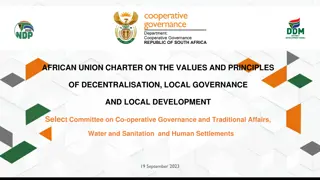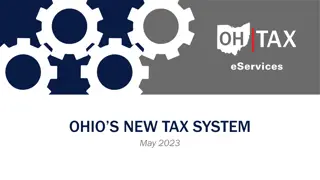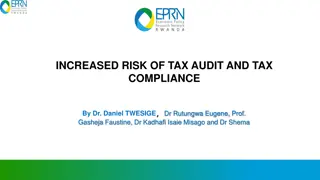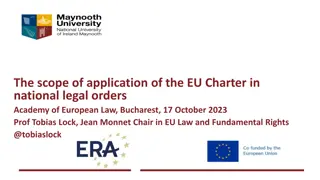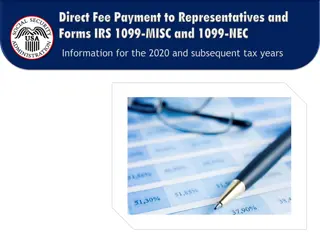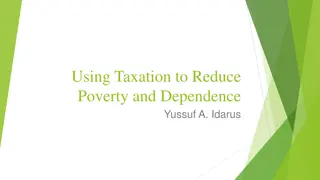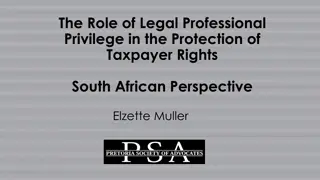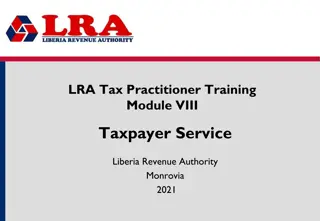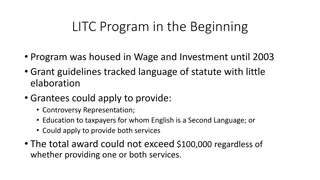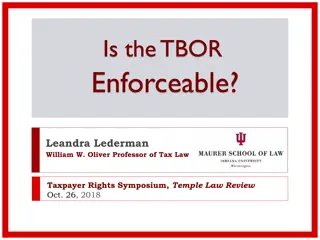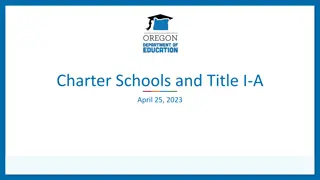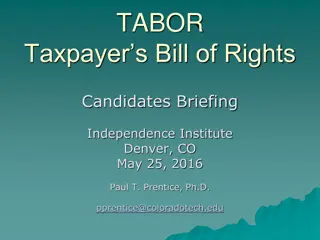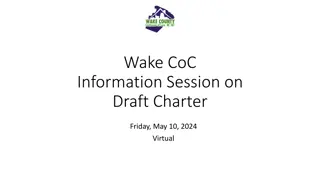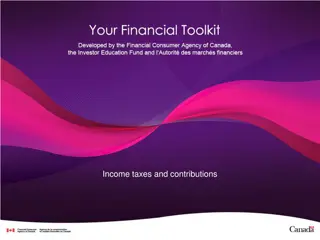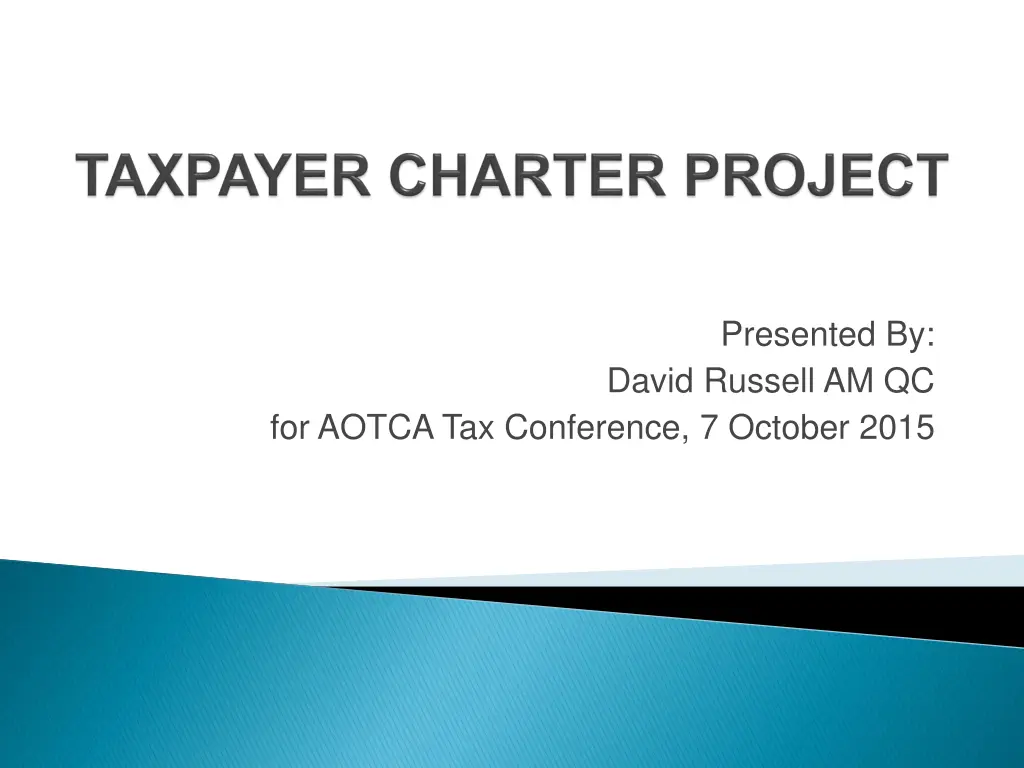
Tax Conference Insights: Responsibilities, Rights, and Collaborations
Delve into the complexities of taxpayer responsibilities, rights, and the overlap of interests among CFE, AOTCA, and STEP. Explore the origins of the project, worldwide coverage, and the research materials compiled from a survey spanning 41 countries.
Download Presentation

Please find below an Image/Link to download the presentation.
The content on the website is provided AS IS for your information and personal use only. It may not be sold, licensed, or shared on other websites without obtaining consent from the author. If you encounter any issues during the download, it is possible that the publisher has removed the file from their server.
You are allowed to download the files provided on this website for personal or commercial use, subject to the condition that they are used lawfully. All files are the property of their respective owners.
The content on the website is provided AS IS for your information and personal use only. It may not be sold, licensed, or shared on other websites without obtaining consent from the author.
E N D
Presentation Transcript
Presented By: David Russell AM QC for AOTCA Tax Conference, 7 October 2015
Origins of the Project Collaboration of Organizations Study Methodology Model Charter Web Site What Comes Next 3
Taxpayer Responsibilities: Increased compliance burden Increased complexity of legislation Increased uncertainty in tax matters 4
Taxpayer Rights: Increasingly limited Little progress No agreed on standard across the world No unified voice No legal force 5
CFE Europe AOTCA Asia Pacific STEP Worldwide 500,000 tax advisors 50 countries 75% of world GDP 6
WORLDWIDE COVERAGE STEP 20,000 CFE 180,000 AOTCA 330,000 Total Membership: over 500,000 worldwide (combined) 7
OVERLAP OF INTERESTS AOTCA CFE STEP STEP overlaps with AOTCA/CFE in private client areas. 8
Authors 3 persons CFE/AOTCA/STEP CFE AOTCA STEP Ian Hayes David Russell Michael Cadesky Website Support staff research editorial 9
Library of Research Materials Compiled Extensive Survey 41 Countries Responded 164 Questions Over 6,500 Answers 10
Refined by Survey Results Test of Validity (Charter Survey) 13
Length 200 pages soft cover book Finance and Revenue Ministers, Commissioners, Deputies in 37 countries OECD E.U. Parliament United Nations IMF World Bank AOTCA/CFE/STEP Media Form Distribution 16
E.U. Parliamentary Committee on Taxpayer Code OECD (Pascal Saint-Amans) UN (Committee of Experts on International Cooperation in Tax Matters) 17
OECD Letter - should be principles based - tax advisors should have more responsibilities - should consider enhanced relationship - uses old fashioned confrontational approach to tax administration Certain Countries - U.K. - Indonesia 18
Final Report Guiding Principles at the Beginning Expanded Provisions on Tax Advisers But otherwise similar Now complete 19
Rights of taxpayer [Responsibility for tax administration] Duties of taxpayer [Rights of tax administration] 20
Taxpayer Rights 1. Integrity and equality The Tax system shall be designed and administered fairly, honestly and with integrity, according to the law, without bias or preference. The Tax system will be designed and administered to provide as far possible certainty, clarity and finality in one s Tax affairs. The Tax system will be designed and administered fairly and cost effectively taking into account the attainment of its purposes. In cases of disputes as to Tax liability an independent, objective, speedy and cost effective appeal process. 2. Certainty 3. Efficiency and effectiveness 4. Appeal and the right to dispute resolution Disputes as to actions of the Tax Authority will be followed up without fear of reprisal under independent oversight. 21
Taxpayer Rights 5. Appropriate assistance Taxpayers who face difficulties in carrying out their responsibilities as Taxpayers will be given appropriate assistance by the Tax Administration. A Taxpayer s affairs and records will be kept confidential and private except in the case of public hearings in litigation or criminal prosecutions. A Taxpayer is required to pay no more than the amount of Tax based on Tax laws. A Taxpayer may be represented by a person of the Taxpayer s choosing. Enforcement action including audits, collections, reassessment, penalties and prosecutions will be proportionate to the circumstances. In the absence of any evidence to the contrary to be presumed honest. 6. Confidentiality and privacy 7. Pay correct amount of Tax 8. Representation 9. Proportionality 10. Honesty 22
Tax Responsibilities 1. Be truthful Be truthful in all Tax matters including legally required disclosures. 2. Provide information Provide information on a timely basis as and when reasonably required. 3. Be cooperative Be cooperative in dealings with the Tax Administration, filing Tax returns and information reporting, the conduct of an audit, and payment of Taxes. 4. Make payment Pay Tax on time without deduction or offset subject to the right to appeal. 5. Comply with the law Comply with Tax responsibilities and seek assistance if necessary. 23
Tax Responsibilities 6. Maintain records Maintain accurate financial records and supporting information for such period as may be reasonably required. 7. Take due care Exercise an appropriate degree of care and diligence in taxation matters. Be held accountable for the correctness and completeness of the information supplied to the Tax Administration whether or not another person has been engaged to prepare, assemble and/or submit the information on your behalf. 8. Retain responsibility for advisors 9. Show courtesy Treat Tax Officers with courtesy and respect, noting that abuse of Tax Officers in performance of their duties is never acceptable. 10. Comply cross border Ensure that all legitimate cross border compliance requirements are met. 24
Right and Responsibility 8 Both reflect our view of the tax adviser Empower our clients to deal with the system Necessarily entitled to do so in confidence Responsible only to clients, but with the same responsibility as clients to comply with the law (and heightened professional responsibility, since we are supposed to know it) Not a tax intermediary 25
Article 1. Introduction and Purpose Article 2. Definitions Article 3. Who and what is covered? Article 4. Fundamental Principles Article 5. General Provisions Article 6. Filing of Tax and Information Returns Article 7. Assessment Process Article 8. Audit Process Article 9. Appeals Process Article 10. Taxpayer Assistance Article 11. Service Standards Article 12. Rulings and Interpretations 26
Article 13. Taxpayer Records Article 14. Privacy and Confidentiality Article 15. Tax Administration Generally Article 16. Burden of Proof Article 17. Tax Legislation Article 18. Retroactivity of Legislation Article 19. Double Taxation and Relief Article 20. Interest and Penalties Article 21. Voluntary Disclosure Article 22. Legislative Process and Consultation Article 23. Tax Levied Only by Virtue of Law Article 24. Equality of Taxpayers Article 25. Vulnerable Persons 27
Article 26. Complaints Article 27. Matters Concerning Tax Advisors Article 28. Breach of Charter Rights Article 29. Enforcement and Collection of Tax, Interest and Penalties Article 30. Tax Avoidance Article 31. Tax Evasion and Dishonesty Article 32. Corruption Article 33. Special European Union Provisions Article 34. Enabling Legislation Article 35. Implementation and Transition Issues Article 36. Amendments to Charter Article 37. Concluding Matter 28
Issue Issue Resolution Resolution Should Charter have legal force? Yes. Rights that cannot be enforced have no value. Not enough. Too hard to enforce constitutional rights and not focussed enough to be practical. Across the world tax systems and administration have similarities. Not comprehensive Rarely holds tax authority accountable Not legally binding Does not consider tax policy and legislation Happier taxpayers are more compliant taxpayers Fairness perception is powerful System overall will work better Taxpayers protected by constitution? Why have a worldwide standard? What s wrong with existing Taxpayer Charters? What benefits are there to governments? 29
Issue Issue Resolution Resolution How specific should a Taxpayer Charter be? Quite specific. General statements of good intent are often just ignored. But if too specific, hard to adapt as worldwide standard. So careful balance is needed. How can a taxpayer enforce Charter rights? It will vary from country to country but either through a complaints system or court intervention if necessary. Will it prevent the tax authority from carrying out its work? The rights and responsibilities are balanced. Implemented properly a Taxpayer Charter should assist the tax administration in its work in many areas. Why would a tax authority give up rights? Because of the taxpayer cooperation expected in return 30
Publish in book form (200 pages) Publish on web site (400 pages) Prepare a summary (16-20 pages) Translation Finding an adoption partner Conference to study the provisions (possible March 2016) 32
Adoption as worldwide standard Give Tax Profession a Worldwide voice Improve Relationships between Taxpayers, Tax advisors and Tax Administrations 33
"The poorest man may in his cottage bid defiance to all the forces of the Crown. It may be frail - its roof may shake - the wind may blow through it - the storm may enter - the rain may enter - but the King of England cannot enter. William Pitt, 1763 34
Big Brother is Watching You. George Orwell, 1984 If you want to keep a secret, you must also hide it from yourself. George Orwell, 1984 35
He gazed up at the enormous face. Forty years it had taken him to learn what kind of smile was hidden beneath the dark moustache. O cruel, needless misunderstanding! O stubborn, self- willed exile from the loving breast! Two gin- scented tears trickled down the sides of his nose. But it was all right, everything was all right, the struggle was finished. He had won the victory over himself. He loved Big Brother George Orwell, 1984 36




